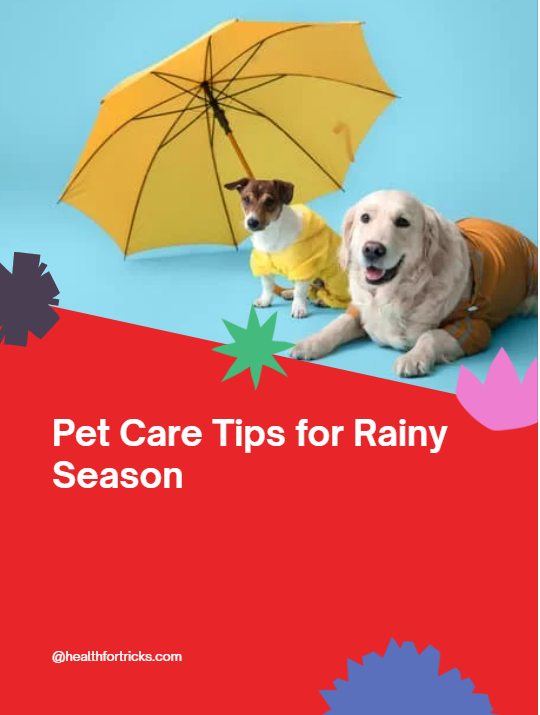Rainy days bring freshness, cooler temperatures, and a break from the scorching heat. But while you may enjoy cozy moments at home with a hot cup of tea, the rainy season poses a number of health and hygiene challenges for pets. From wet fur to infections, parasites to anxiety, the monsoon can be a stressful time for your furry companions.
In this blog, we’ll share essential pet care tips for the rainy season to help you keep your pet safe, clean, and comfortable during the wet months.
1. Protect Your Pet from Getting Wet
When taking your dog for a walk, make sure they don’t get drenched in the rain. A soaked coat can lead to skin infections, colds, and even fungal diseases.
Tips:
- Use a pet raincoat to cover your dog or cat during outdoor trips.
- Carry an umbrella or pet stroller for extra protection.
- Keep walks short and quick during heavy rain.
Getting wet repeatedly weakens their immune system, especially for senior pets or young puppies.
2. Dry Your Pet Immediately After Getting Wet
Even if your pet gets a little wet, drying them off quickly is crucial. Wet fur traps moisture and can lead to bacterial or fungal growth.
Tips:
- Use a soft, absorbent towel to gently dry them.
- Use a pet-safe hair dryer on low heat to dry thick or long-haired breeds.
- Make sure their paws, ears, and underbelly are completely dry.
Moisture in ears, especially in floppy-eared dogs like Cocker Spaniels or Beagles, can cause ear infections.

3. Take Extra Care of Paws
The ground during the rainy season is often muddy, slippery, and full of sharp or infected objects.
Tips:
- Wash your pet’s paws after every walk.
- Apply paw balm or coconut oil to keep their paw pads soft and infection-free.
- Consider using pet boots to protect their feet during walks.
Check paws for leeches, ticks, or cuts regularly.
4. Watch Out for Infections and Parasites
Warm and wet conditions are ideal for fleas, ticks, and other parasites to thrive.
Tips:
- Use anti-tick and flea sprays or powders regularly.
- Clean your home and your pet’s bedding frequently.
- Visit your vet for deworming and anti-parasite treatments as advised.
If your pet is itching excessively or has visible skin issues, consult your veterinarian immediately.
5. Ensure Clean and Dry Bedding
A moist or damp bed is a breeding ground for bacteria and fungus. Make sure your pet’s resting area is always dry and clean.
Tips:
- Place the bed in a dry, warm corner of the house.
- Use moisture-proof mats or washable bedding.
- Wash and sun-dry the bedding often.
Avoid placing your pet’s bed directly on the floor, especially in humid or flood-prone homes.
6. Maintain a Healthy Diet and Hydration
The rainy season may cause pets to eat less or drink less water. Reduced physical activity can also lead to sluggishness and digestive issues.
Tips:
- Provide a balanced diet with essential nutrients and fibers.
- Encourage them to drink clean, filtered water.
- Avoid giving leftovers or cold food that may cause stomach upset.
Add a few drops of herbal tonics or vet-recommended supplements to boost immunity.
7. Avoid Stagnant Water and Muddy Areas
Stagnant water is often filled with bacteria, parasites, and harmful chemicals. It can lead to conditions like leptospirosis, a serious disease in dogs.
Tips:
- Don’t allow your dog to play in puddles or dirty water.
- Avoid parks or areas with waterlogging.
- After outdoor time, always wash and inspect your pet’s paws and coat.
If you notice signs like fever, vomiting, or lethargy, consult a vet immediately.
8. Manage Rain Anxiety and Noise Phobia
Thunderstorms and heavy rainfall often cause anxiety or stress in pets, especially dogs.
Tips:
- Create a safe and quiet space for your pet.
- Use noise-cancelling ear covers or calming music.
- Try pheromone sprays or natural calming supplements if needed.
Spend extra time cuddling, talking softly, and staying close to your pet during noisy rains.
9. Groom Regularly but Safely
Tips:
- Brush your pet daily to remove loose fur and check for ticks.
- Bathe only with vet-approved shampoos and dry them properly.
- Use anti-fungal powders or sprays if advised.
For cats, make sure they are grooming themselves properly; if not, help them clean and brush.
10. Monitor Behavioral and Health Changes
Rainy weather can cause mood swings, lethargy, or even depression in pets due to reduced outdoor activity.
Watch out for:
- Changes in eating or drinking habits.
- Increased scratching, biting, or licking.
- Signs of cough, cold, or fever.
- Refusing walks or playtime.
Consult a vet for any unusual symptoms or if your pet seems unwell for more than a day.
Caring for pets during the rainy season requires extra effort and awareness. By taking preventive steps and giving your pet the right care and attention, you can make the monsoon comfortable and safe for them.
A little love, regular grooming, and a hygienic environment can go a long way in keeping your pet healthy and happy—rain or shine.